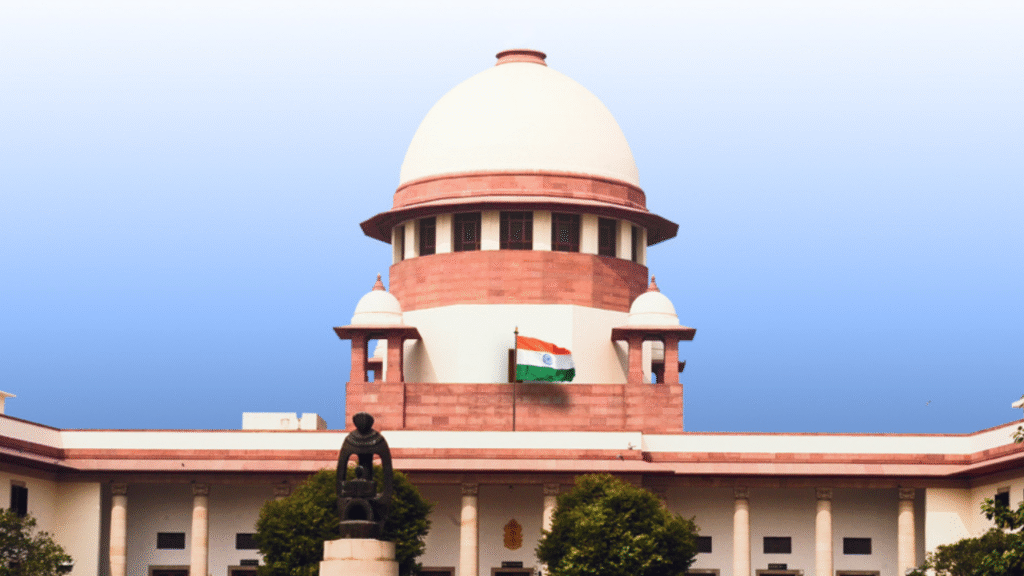CIVIL LAW – PROPERTY LAW – WILLS – FAMILY SETTLEMENTS – INHERITANCE – HINDU SUCCESSION ACT
(2025) 7 SCD 62 : 2025 INSC 879
SUPREME COURT OF INDIA
CIVIL APPEAL NO(S). 5921, 5922 OF 2015
Facts: The case involved rival claims between the legal representatives of late Metpalli Rajanna over a chunk of land measuring 4 acres and 16 guntas in Dasnapur village. The original landholder, Metpalli Ramanna, died intestate prior to 1949, and his properties, totaling 18 acres 06 guntas, devolved to his son, Metpalli Rajanna. Rajanna had two children, Muthaiah and Rajamma, from his first marriage, and later married Lasum Bai (the plaintiff), with whom he had no children. After Rajanna’s death in 1983, a dispute arose between Lasum Bai and Muthaiah over property rights. Lasum Bai contended that Rajanna had executed a registered Will (Ext.-A1) on 24th July 1974, and had also made an oral family arrangement, distributing his properties among Lasum Bai, Muthaiah, and Rajamma. Muthaiah, on the other hand, argued that the properties were joint ancestral properties, that Rajanna died intestate, and that the Will was a “got up document”. Lasum Bai had sold a portion of her purported share (2 acres) to Sanjeeva Reddy, a sale that remained unchallenged, and entered an agreement to sell the remaining 4 acres and 16 guntas to Janardhan Reddy.
Procedural History: Muthaiah initially filed an injunction suit (Original Suit No. 101 of 1987) to restrain Lasum Bai from selling the properties, which was decreed in his favor, but the District Munsif explicitly stated that Lasum Bai’s title was not examined, allowing her to file a separate suit for declaration of title. Accordingly, Lasum Bai filed Original Suit No. 2 of 1991 for declaration of her title over the suit properties.
Trial Court (District Judge, Adilabad): Vide judgment dated 15th November 1994, the trial court decreed the suit in favor of Lasum Bai, finding that M. Rajanna had executed the Will (Ext.-A1) in a sound disposing mind. It also concluded that the family arrangement pleaded by Lasum Bai was true, based on admissions by Muthaiah regarding the cultivation and exclusive possession of respective land portions by the parties. Lasum Bai was granted a declaration of true ownership and exclusive title over the suit schedule properties, along with a permanent injunction against Muthaiah and Rajamma.
High Court (Andhra Pradesh at Hyderabad): Vide judgment dated 23rd January 2014, the High Court allowed Muthaiah’s appeal in part, setting aside the trial court’s decree. It held that the properties were part of joint family properties and determined that Muthaiah was entitled to a 3/4th share and Lasum Bai to only a 1/4th share, granting a preliminary decree for partition.
Supreme Court’s Analysis and Findings: The Supreme Court noted the admitted position that after M. Ramanna’s death, revenue entries (Khasra Pahunis) for the land were in M. Rajanna’s name, which served as evidence of ownership under prevailing revenue laws. The Court found the Will (Ext.-A1) to be a registered document, and Muthaiah himself, in his deposition, admitted the signatures on the Will to be those of his father, M. Rajanna. The Will distributed properties in defined proportions among Lasum Bai, Muthaiah, and Rajamma, and this distribution was almost in the same proportions as the oral family settlement. The Court highlighted that the genuineness of a registered Will carries a presumption, and the burden lay on Muthaiah, who disputed its existence, to prove otherwise. Muthaiah’s admission that Lasum Bai was in possession of 6 acres and 16 guntas of land, as per the Will, further supported the trial court’s findings. The Court stated that the trial court was correct in concluding that M. Rajanna had made a fair distribution of his tangible assets through the Will and oral family settlement, a conclusion fortified by the admitted possession of the properties by Lasum Bai and subsequently by Janardhan Reddy. The genuineness of the Will was also supported by the fact that it granted a major share of the property to Muthaiah, indicating no intention to disinherit him.
Decision: The Supreme Court held that the High Court manifestly erred in interfering with the well-reasoned judgment of the trial court and in reducing Lasum Bai’s share in the suit properties. Consequently, the Supreme Court:
Reversed and set aside the High Court’s impugned judgment dated 23rd January 2014.
Restored the judgment and decree of the trial court dated 15th November 1994.
Allowed Civil Appeal No. 5921 of 2015 (filed by Lasum Bai’s estate and Janardhan Reddy’s legal representatives).
Dismissed Civil Appeal No. 5922 of 2015 (filed by Muthaiah’s legal representatives).

